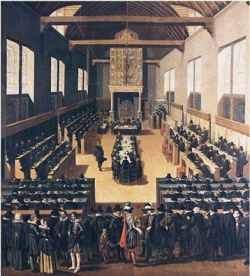 Article 12: The Assurance of Election
Article 12: The Assurance of Election
Assurance of this their eternal and unchangeable election to salvation is given to the chosen in due time, though by various stages and in differing measure. Such assurance comes not by inquisitive searching into the hidden and deep things of God, but by noticing within themselves, with spiritual joy and holy delight, the unmistakable fruits of election pointed out in God's Word–such as a true faith in Christ, a childlike fear of God, a godly sorrow for their sins, a hunger and thirst for righteousness, and so on.
__________________________________________
We now come to one of the most troubling aspects of the biblical teaching about election, and that is the question, “how do we know that we are numbered among the elect?” Assurance of salvation is one point where the rubber hits the road for many struggling saints. The authors of the Canons are careful to point out that “assurance...is given to the chosen in due time, though by various stages and in differing measure.” Assurance of salvation is a struggle for some, and not at all for others. Not all Christians have the assurance of their salvation at all times. Yes, this is a difficult struggle for many.
The primary reason for a lack of assurance is human sinfulness. Although we were chosen before the foundation of the world (Ephesians 1:4), and we are called to faith in Christ at a particular point in time (Ephesians 1:13), and are then justified, and have the hope of heaven and glorification, the sinful nature is not eradicated until death (Romans 7:14-25; Galatians 5;17). In fact, the sinful nature (the flesh) puts up a fierce struggle until we take our last breath, and finally enter into the presence of God. When we are disobedient to God’s commands, or when we are indifferent to the things of the Lord, we may indeed feel God’s displeasure with us, and we may, for a time, question whether or not we are among the elect.
Lest this be too big a burden for us to bear, we need to remind ourselves that a non-Christian never once worries about whether or not they are numbered among the elect! Only a Christian regrets his or her actions, and feels what we call “the conviction of sin.” In these cases, the law does its work, and the Spirit moves us to repent. As every Christian knows, this is a very miserable place to be.
As Paul points out in Romans 7:14 ff., only the Christian desires to obey God’s law, and then struggles with his or her repeated inability to do so. Only the Christian struggles with desiring to do what is right, and only the Christian desires to avoid doing what is wrong in the sense described by Paul. Only the Christian feels this misery when we fail to do things we know that God requires of us. According to Paul, this struggle is the normal Christian life! Paradoxically, the fact that we struggle with sin is not a sign that we are not numbered among the elect. Rather, it is just the opposite! The struggle with sin is the sign that God is working in us to will and do of his good pleasure (Philippians 2:13). This is a struggle which a non-Christian never experiences. Thankfully, God does not leave us where we are, he sanctifies us. At times, his work within us can be an intense, and difficult struggle. But it is his work.
A second reason we may lack the assurance of our salvation is to be found in the unbiblical teaching and false doctrine about the nature of the Christian life, which so many of us learned in our evangelical or Roman past. In much of the evangelical world, assurance of salvation is often based upon performance, obedience, and external acts of piety. If it was a good week, then we feel God’s favor. If we have a good devotional time, if we witnessed to our co-worker, then we are doing just fine. If it was a bad week, then we need to worry! We have not let Jesus become Lord over every area of our lives, and we are not living in victory. When this happens, we are told that we are in real trouble. The voice in our head starts to tell us, “we might not be Christ’s . . . . If we were, we’d be doing better.”
At this point, the Canons pointedly remind us not to seek the assurance of our salvation in our own performance. Instead, we must seek our assurance through those things taught in Scripture—“such as a true faith in Christ, a childlike fear of God, a godly sorrow for their sins, a hunger and thirst for righteousness, and so on.” In other words, we are not to look within to find assurance of our salvation, but instead we are to look outside ourselves to the promises made in Scripture about the sufficiency of saving work of Christ. God’s word says that Christ saves sinners, even the worst! Do we believe that promise, regardless of our own performance? That is where assurance begins–but not necessarily where it ends.
This is why the authors of the Canons direct us to those promises in the word which need to be repeatedly declared to us audibly by our minister, our elders, and fellow Christians. When we lack assurance, we must learn to quickly run to the promises of Christ in his word.
Our fear of failure--that we might eventually fall and come under the wrath of God--often manifests itself in displeasure at our own performance. We take our failures as a sign that God hates us. Ironically, our displeasure with our progress is actually a sign of God's favor toward us! God is convicting us of our sin. God is bringing his work in us to fruition. But far too many times, we have this completely backwards. We take our poor performance in the Christian life as a sign that we are not elect, when, in fact, our sorrow over our poor performance, is actually a sign that we are among the elect! No non-Christian has ever experienced this struggle. No non-Christian ever worried about this. But every Christian struggles with sin.
Let us not forget that the closer we grow to God, and the more we know his word, the more dissatisfied we may be with our present level of sanctification. Not one of those whom God passes over and leaves in their sin will ever worry about their level of sanctification. Are we sorrowful at our sins? Do we hunger and thirst for righteousness? These, too, are signs of assurance, not signs of God's wrath toward us.
Another reason why so many lack assurance, is because we are looking for it in all the wrong places! When we seek assurance of our salvation in our feelings and opinions, our religious experience, our performance, we are setting ourselves up for a gigantic disappointment. God does not promise to give us assurance through these things. Rather, he gives us assurance through his word and sacraments. Through these means of grace, God’s Spirit bears powerful witness to us that we are the children of God.
But how does he do this? He does this through the promise of forgiveness of sins given in his word, and through the strengthening of our faith given to us through the sacraments. Through the promise of the gospel, and through water, wine, and bread, God promises us that we are his. Yet, if we fail to take avail of the means of grace that God has graciously given to us, of course, we will suffer, and the loss of assurance is one of the first things that may go, especially if we we start looking for assurance in the wrong place--i.e., our own obedience or performance.
At the end of the day, how do we know that we are among the elect? The answer is simple. Do you believe the promise in Scripture that Christ saves sinners, even the worst? Do you believe that Christ's death can even save you? Are you unhappy with your present level of sanctification? Are you sorry for your sins?
If you can answer these questions with a “yes,” then take heart, for you are certainly numbered among the elect!
 Monday, February 25, 2008 at 07:13AM
Monday, February 25, 2008 at 07:13AM  “They have church on TV down here [MLB Spring training in Florida], you don’t have to leave the couch.”
“They have church on TV down here [MLB Spring training in Florida], you don’t have to leave the couch.” Kim Riddlebarger
Kim Riddlebarger
 This was Yankees reliever LaTroy Hawkin's comment upon learning that the Yanks don't start working out until noon on Sunday so players can go to church.
This was Yankees reliever LaTroy Hawkin's comment upon learning that the Yanks don't start working out until noon on Sunday so players can go to church.









